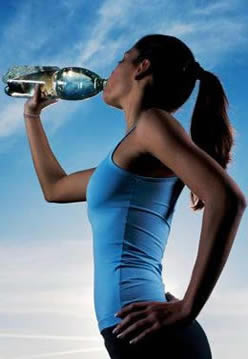DEHYDRATION!!! |
||
All summer, people are spending more time working and playing outdoors. When you’re exercising in hot, humid conditions, drinking enough of the right kinds of liquid is especially important. When the temperatures rise, it is essential to exercise with adequate fluid intake, and to replace the fluids you lose during athletic activity. Research by the National Athletic Trainers' Association (NATA) indicates that staying hydrated helps maintain athletic performance and reduces the risk of exertion-related illnesses such as cramps, heat exhaustion and heat stroke. "Staying well-hydrated is probably the most important thing you can do to stay healthy and perform well during summer exercise," said Bill Martin, regional sports medicine coordinator at Health South Sports Medicine & Rehabilitation Center in Birmingham, Ala. "Evaporation, or sweat, is the body's way of cooling itself, and without adequate fluid in your system, your body is unable to do that. If you lose just one or two percent of your bodyweight during exercise, it negatively affects performance. A loss of more than three percent of bodyweight greatly increases the risk of heat stroke or heat exhaustion." How much liquid you need depends on your bodyweight, the activity you're engaged in and the outside temperature. "A good rule of thumb is to drink eight to ten ounces of water eight times a day," said Martin. "For the athletes are need 17 to 20 full ounces of water two or three hours prior to exercise to be properly hydrated. Then, during high- intensity training, we suggest an additional seven to ten ounces of liquid every 10 to 20 minutes." This exclude juices or sodas, which have sugar and caffeine. "The people who are most prone to heat-related illness are those who exercise during the hottest time of the day, those who don't take frequent breaks, or who wear tight-fitting, dark clothing." To prevent the worst consequences of dehydration, it is important to recognize the symptoms. Initially dehydration causes thirst, irritability and general discomfort. If the condition goes untreated, it can lead to headache, cramps, chills, nausea, vomiting, a sensation of heat in the head or neck, decreased performance, dizziness and even fainting." Heat exhaustion is the most common exertion-related heat illness. This results in profuse sweating, pale, cold and clammy skin, cramps, fast pulse and feeling faint. "Fortunately, treatment for heat exhaustion is fairly simple; just get out of the sun into a cool, dry place, and drink lots of fluids." Heat stroke is the most serious of the heat-induced illnesses. It is marked by hot, dry skin. The evaporative process has shut down, so the body has stopped sweating. Body temperature can rise to as much as 105 degrees. "This is a medical emergency and requires immediate transportation to an emergency room. Heat stroke actually can develop without exertion over the course of several days in an extremely hot environment, but exercise-induced heat stroke is most common," Martin explains. "Essentially, the person is sweating so fast that his or her body doesn't have time to cool itself off. When this happens, the organs can actually begin to shut down. This is probably what happened in the high-profile cases of some preseason football players who died during practice. "I often stress the need for high school athletes to have a pre-participation physical exam to see if they may be susceptible to heat-related illness, and to identify any other conditions, such as diabetes or asthma, that might affect their ability to perform," said Martin. "I also urge coaches and athletes to keep the lines of communication open so that players feel comfortable speaking up if they are not feeling well during training. Once they get to the point that they are nauseous or have a headache, they're in trouble." More about Avoiding dehydration |
||
Salud + Health Info is for information and educational purposes only. You should not rely on this information as a substitute for personal medical attention, diagnosis or hands-on treatment. If you are concerned abut your health or that of a child, please consult your family’s physician or health provider immediately and do not try to diagnose yourself. Copyright © 2001-2006 Info Option Network |
Bienvenido a la primer revista dedicada al cuidado de la salud
 info
info
The first, the best & the only English & Spanish Magazine in San Diego, California
Enjoy Fireworks Safely. As the July 4th holiday approaches, the Home Safety Council urges families to enjoy fireworks the safer way, by attending locally sanctioned fireworks shows presented more
|
Better be Safe than Sorry With the Sun Sun safety should actually be practiced year-round, but we are more likely to more |
Why to Avoid Dehydration? Even minor dehydration can lead to poor performance and reduced coordination, as well... More
|
|
